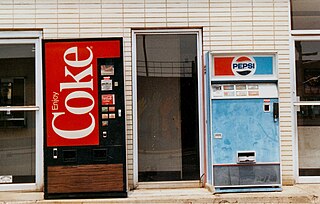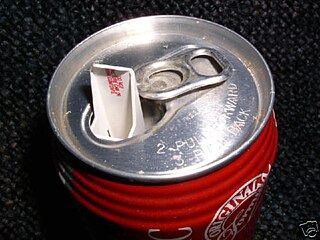
Coca-Cola, or Coke, is a cola soft drink manufactured by the Coca-Cola Company. In 2013, Coke products were sold in over 200 countries worldwide, with consumers drinking more than 1.8 billion company beverage servings each day. Coca-Cola ranked No. 94 in the 2024 Fortune 500 list of the largest United States corporations by total revenue. Based on Interbrand's "best global brand" study of 2023, Coca-Cola was the world's sixth most valuable brand.

Cola is a carbonated soft drink flavored with vanilla, cinnamon, citrus oils, and other flavorings. Cola became popular worldwide after the American pharmacist John Stith Pemberton invented Coca-Cola, a trademarked brand, in 1886, which was imitated by other manufacturers. Most colas originally contained caffeine from the kola nut, leading to the drink's name, though other sources of caffeine are generally used in modern formulations. The Pemberton cola drink also contained a coca plant extract. His non-alcoholic recipe was inspired by the coca wine of pharmacist Angelo Mariani, created in 1863.

Pepsi is a carbonated soft drink with a cola flavor, manufactured by PepsiCo. As of 2023, Pepsi is the second most valuable soft drink brand worldwide behind Coca-Cola; the two share a long-standing rivalry in what has been called the "cola wars".

Coca-Cola Vanilla is a vanilla-flavored version of Coca-Cola, introduced in 2002 but subsequently discontinued in North America and the United Kingdom in 2005, only remaining available as a fountain drink. It was relaunched in the US in 2007; in Denmark in 2012, the UK in 2013, and Canada in 2016. Vanilla Coke has been available in Australia since its initial introduction in 2002, being produced by Coca-Cola Europacific Partners. Originally announced as a limited edition in the UK, it became permanent for several years; however, it was again discontinued in the UK in Summer 2018. Despite this, the product has still been distributed in related brands Diet Vanilla Coke and Coke Vanilla Zero.

New Coke was the unofficial name of a reformulation of the soft drink Coca-Cola, introduced by the Coca-Cola Company in April 1985. It was renamed Coke II in 1990, and discontinued in July 2002.

The Cola wars are the long-time rivalry between soft drink producers The Coca-Cola Company and PepsiCo, who have engaged in mutually-targeted marketing campaigns for the direct competition between each company's product lines, especially their flagship colas, Coca-Cola and Pepsi. Beginning in the late 1970s and into the 1980s, the competition escalated until it became known as the cola wars.
Mirinda is a brand of soft drink that was created in Spain in 1959 and has been distributed globally by PepsiCo since 1970. Its name comes from the Esperanto translation of "admirable" or "amazing".

Pepsi Max is a low-calorie, sugar-free cola, marketed by PepsiCo as an alternative to Pepsi and Diet Pepsi, except for Norway, where it is the main Pepsi flavor. Pepsi Max is available primarily in Asian, European and Australia/New Zealand markets. While Pepsi Max was released in April 1993, it did not become available in the United States until 2007.

The Coca-Cola Company is an American multinational corporation founded in 1892. It manufactures, sells and markets soft drinks including Coca-Cola, other non-alcoholic beverage concentrates and syrups, and alcoholic beverages. Its stock is listed on the New York Stock Exchange and is a component of the DJIA and the S&P 500 and S&P 100 indexes.
Odwalla Inc. is an American health food company based in Dinuba, California. Founded in Santa Cruz, California in 1980 and formerly headquartered in Half Moon Bay, California from 1995 to 2020, the company's product lines include fruit juices, smoothies, soy milk, bottled water, organic beverages, and several types of energy bars known as "food bars".

PepsiCo, Inc. is an American multinational food, snack, and beverage corporation headquartered in Harrison, New York, in the hamlet of Purchase. PepsiCo's business encompasses all aspects of the food and beverage market. It oversees the manufacturing, distribution, and marketing of its products. PepsiCo was formed in 1965 with the merger of the Pepsi-Cola Company and Frito-Lay, Inc., PepsiCo has since expanded from its namesake product Pepsi Cola to an immensely diversified range of food and beverage brands. The largest and most recent acquisition was Pioneer Foods in 2020 for US$1.7 billion and prior to it was buying the Quaker Oats Company in 2001, which added the Gatorade brand to the Pepsi portfolio and Tropicana Products in 1998.

MagiCans were special, mechanical cans used by The Coca-Cola Company in the United States of America as a part of their $100-million "Magic Summer '90" promotion. The MagiCan promotion began on May 7, 1990, and ended on May 31.
Energy Brands, also doing business as Glacéau, is a privately owned subsidiary of The Coca-Cola Company based in Whitestone, Queens, New York, that manufactures and distributes various lines of drinks marketed as enhanced water. Founded in May 1996 by J. Darius Bikoff with an electrolyte enhanced line of water called Smartwater, Energy Brands initially distributed its products to health food stores and independent retailers in the New York area. Adding Fruitwater and Vitaminwater to its line in 1998 and 2000, respectively, the company expanded to nationwide distribution in the early 2000s.
Tab Clear was a variation of Tab. It is Coca-Cola's contribution to the short-lived "clear cola" movement during the early 1990s. It was introduced in the United States on December 14, 1992, in the United Kingdom a month later and in Japan in March 1993 to initially positive results. Tab Clear was, however, discontinued after only a short time of marketing in 1994. Unlike most other "clear" soft drinks, Tab Clear contained caffeine and, according to the company, had the flavor of cola.

Ajegroup, commonly known as AJE, is a Peruvian multinational company dedicated to the manufacture, distribution and sale of alcoholic and non-alcoholic beverages. The company was founded by the Añaños-Jerí Family in 1988 in Ayacucho, Peru. It is known for its flagship products Kola Real and Big Cola.

Dr Pepper is a carbonated soft drink. It was created in the 1880s by pharmacist Charles Alderton in Waco, Texas, and first served around 1885. Dr Pepper was first nationally marketed in the United States in 1904. It is now also sold in Europe, Asia, North and South America. In Australia, New Zealand and South Africa, Dr Pepper is sold as an imported good. Variants include Diet Dr Pepper and, beginning in the 2000s, a line of additional flavors.
The Hangzhou Wahaha Group Co., Ltd. is a private group of companies, and the largest beverage producer in China. The company is headquartered in Hangzhou, Zhejiang province. "Wa ha ha" signifies "laughing child".
The Pepsi Generation, is the theme of an advertising campaign for Pepsi-Cola, a US brand of soft drink, that launched in 1963 as the result of a slogan contest. A new car was awarded to the writer of the winning slogan. The contest was the brainchild of Alan Pottasch, a PepsiCo advertising executive, and it was won by Appleton, Wisconsin resident, Ellen M. Reimer. Her slogan invited consumers to "Come Alive! You're the Pepsi Generation!" The original "Come Alive" jingle was performed by singer Joanie Sommers in her memorable "breathy" vocal style. As of 2024, this logo is still used on merchandising.

Red Bull Simply Cola is a beverage from Red Bull GmbH, makers of the energy drink Red Bull. The cola, which contains natural flavouring and caffeine, was introduced in 2008 in several countries.

759 Store is a Hong Kong chain store selling groceries and snacks. The name 759 is the Hong Kong Stock Exchange code for its parent company, CEC International Holdings Limited. Its Chinese name originated from the Japanese drama Oshin. 759 stores mainly import Japanese, Korean and other foreign food items and sells them more cheaply than other supermarkets in Hong Kong.














